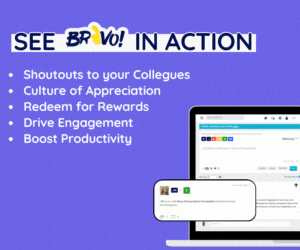
Engaged employees are an asset for any organization. It is why companies have been opting for various methodologies to make their employees more engaged. However, despite all the efforts made, very few organizations successfully increase employee engagement.
The importance of engaged employees for organizations, and the unsuccessful attempts of companies for it, have made employee engagement become the Achilles heel.
One of the reasons why a company remains unsuccessful in addressing the issue of employee engagement is that it is not able to identify which of one its employees is being engaged.
For an organization to make its endeavors concerning the engagements successful, it should be able to determine the engaged employees amongst its workforce. And the reason is that, with it, it can pick out the disengaged employees and can take the necessary measures for enhancing their engagement level.
This article brings you the top traits of engaged employees, so you can distinguish the engaged and disengaged employees. Also, it will help you to recognize the engaged employees and work on the disengaged ones.
Read the article below:
What is an engaged employee?

Your employees are said to be engaged if they have passion, dedication, and enthusiasm towards the role of their jobs. When employees are engaged, it makes them more dedicated towards their respective organizations. Thus, a company can reach newer heights of success with its engaged employees.
For an organization to accomplish its mission and vision, along with the goals, it becomes easier when it develops engagement amongst its workforce. Thus, engaged employees can do wonders for a company, and it goes without saying the amount of productiveness such employees exhibit.
Truly, there exists no substitute for an engaged workforce.
What are some key traits of engaged employees?
Engaged employees are focused
One of the traits of the employees that are most engaged is that they are focused on their job. They are enthusiastic about their job role, and this enthusiasm leads them to take on some of the challenging tasks they may face.
The focused employees are also passionate about learning new things. The passion for learning enables these employees to become the cream of the crop of their domain.
The focus, passion, and engagement of the engaged employees is a result of the recognition that they rightfully receive. It means for your employees to be highly-engaging towards their work, they should be acknowledged for their hard work and efforts.
Engaged employees are innovative

For employees to become innovative, it requires them to go above and beyond their supposed tasks. But it is only possible when the employees possess a passion for their job and are not disengaged.
With your employees engaged and having little to no passion for what they do, they are likely to think about their day-to-day tasks only. And this decreases the chances of even the highly skilled employees to do innovations for themselves and their employer organizations.
The focus of the employees being only on their regular tasks and not anything beyond may seem to work for many companies. Innovation, however, requires more than this. But if the employees are dedicated, not only can they perform their day-to-day tasks regularly, they also tend to become ingenious.
Since the committed employees are passionate learners, their eagerness to learn makes them do wonders in their careers. It also helps them to do innovations in their respective domains.
The thought process of such employees is not limited by what is believed to be unachievable. And as these employees also feel they belong to their organization, they are not hesitant to share their aspirations, even unorthodox.
All this leads the employees, the focused ones, to become innovative and do innovations. It, besides benefiting the very employee, also brings manifold advantages for the company.
Focused employees are better at communications
You will come across such individuals in your life with below-average communications. However, the same individuals will be the ones with above-average communications skills in the job roles they are passionate about.
The reason why such individuals with lower communication abilities in their non-professional lives are able to display good communication skills at the jobs they’re dedicated to is that they are confident of
their skills.
It is the passion that gives the introverted employees the confidence of their abilities, making them show tremendous skills in communications.
Focused employees have leadership qualities

Naturally, when your employees have little to no passion for their job roles, their passion for taking on the leadership roles is also very limited. For, a lack of passion makes them perceive their regular work as a burden; the additional role of leadership would seem to further this unwelcomed burden.
For the disengaged employees, the daily work seems to be “too much,” with limited energy and excitement for their respective roles. And all this makes them not take any role pertaining to leading other employees.
On the contrary, if your employees are engaged, they are highly likely, and in some cases keen, to accept and take on the challenging role of leadership.
Not necessarily, though, however still, there is always a prospect of the engaged employees to have leadership qualities. It may be because such individuals have high engagement and passion for their roles. And, thus, they are willing and keen to lead others in the same role with the same passion.
Focused employees are good listeners
Besides being good at communications, focused employees also tend to be better listeners. It means that in addition to sharing their thoughts, views, and perceptions effectively, an engaged employee also listens to the opinions of others.
Your employees who are engaged understand that the organization they are working for will thrive only when each of their colleagues plays their role. Thus, understanding it, such employees not only are open to listening to the views of other employees but also encourage listening in the workplace.
Importantly, the listening trait of these employees is limited to those working at higher or lower positions. In fact, they listen to their colleagues at all positions alike.
Lastly, besides being good at listening, such employees are also good at recognizing their employees. They appreciate the good work of others and are not insecure about their own shortcomings and the success of others.
Focused employees are helpfully collaborative

Want to know which one of your employees is highly engaging? See if they collaborate with others for their work. And if they do, observe how helpful they are when working with others. With both these criteria, you can learn which one of your employees has high engagement levels for their work.
The employees who are engaged aspire to achieve great things, which makes them become highly collaborative with others. It also makes them work along with other employees at all positions.
Within this trait, there’s another characteristic that such employees have.
In addition to making collaborations, the engaged employees make sure that the one they’re working with completes their part of the work as well. They try to help their team members if they are stuck and go above and beyond if required.
It means that engaging employees who are collaborative are not concerned with completing their own tasks only. They consider it as their moral duty to help others complete their tasks.
Nonetheless, collaborating and being helpful in these collaborations requires one to be equally happier and desire for the success of others. And your focused employees are more likely to contend with the success of others, which makes them help others in their career development.
To conclude, your loyal employees are not only effectively and helpfully collaborative but also happy to help others in achieving their goals and milestones. It makes the workplace more productive and high-performing, which eventually makes a company thrive
Focused employees show up more
One of the most evident traits of the focused employees is that their attendance log is far better than those who are disengaged from their work.
Your employees who are dedicated to their roles are more excited to come to work than those who have little to no dedication.
The stats also seem to advocate increased presence levels of an engaged employee than a disengaged one. As per a Gallup survey, your employees who are disengaged are more absent from work (in the form of sick or other leaves).
On the other hand, passionate employees have decreased levels of absence. Also, their sickness and other leaves are genuine or out of necessity. Therefore, their leaves are not a way to escape from work.
The explanation for why dedicated employees have no or little absenteeism is that they don’t come to the office for the sake of showing up only. Instead, they perceive every day at work as an opportunity to do wonders.
With an engaged employee showing up to work more, the personal goals of such employees become aligned with the goals of their organization. And whatever such employees work as part of their aspirations, it is bound to benefit the organization eventually.
It is, therefore, a significant indication that an employee is engaged if they are regular in their work attendance and less keen to take leaves..
Engaged employees seek career development opportunities

One of the notable characteristics of employees that are engaged is that they are in continuous search of opportunities for excelling in their respective careers. They continuously seek opportunities that may help them further their current skills so as to climb up their career paths.
The passionate employees are not complacent with their current skill levels and roles. They aspire to grow, which makes them passionate about learning new skills and technologies or anything that might help them reach the top.
The opportunities that such employees seek for their career development include, but are not limited to, seminars, conferences, online courses, training, and similar.
Most of the dedicated employees opt to enhance their own capabilities for the sake of improving their current job positions. However, some of these employees consider these opportunities as a way of benefiting their organization, as they may consider it a place from where their career began.
Engaged employees are adaptable
There is nothing constant in this world. However, if there is something that remains the name, it is the change itself. Therefore, change within a company/organization is also inevitable. It is the change that makes a company become an organization, from a smaller startup to a large organization.
With the development in a company, or due to the necessity of a business to change due to external factors, the employees are also required to adapt to the changing events and circumstances.
If the employees do not adapt to the changes, they either no longer remain the part of their companies, or the companies start lagging behind. Therefore, making your employees engaged in their work is important since such employees are mostly adaptable.
Your focused employees are more likely to adapt to the changes resulting from the fast-paced business world. In comparison, the employees that are not adaptable lack the competency to adjust themselves so as to evolve as required.
The enthusiastic employees of an organization are eager to alter in any aspect, even if it places them in an uncomfortable position. The passion that these employees have for their work makes them go through the pain of change. And this makes a company strive and survey under any circumstances.
Focused employees go above and beyond

An attribute that an engaged employee is going the extra mile. Such employees go beyond their call of duty and thus exceed the expectation of their company.
Employees that are disengaged show clear signs of their disengagement by their lack of meeting the company expectations. The reason is that such employees come to the office for the sake of showing up only. And this also makes it impossible to make the required job done, let alone exceed the expectations.
As for the employees who are passionate about what they do, more often than not, they surpass what the company expects them to minimally perform. It is why the companies that have engaged the workforce find it more productive.
If stats are to be believed, an engaged workforce is 22% more productive than a disengaged workforce.
So, it goes without saying the wonders engaged employees can do for their companies.
Engaged employees align their goals with that of organization’s
You can expect that your engaged employees have their goals aligned to what the goals of your organization are. Thus, whatever the goals they set for themselves professionally, they ensure that they fall in line with the goals of the company.
Thus, the professional growth of such employees certain the growth of their employer organization.
What are the 12 elements of employee engagement?
Work aligns with the job position

One of the key elements of employee engagement is that the daily tasks of an employee align with their job description. It means that their routine work pertains to their job position and not beyond.
Presence of all the necessities
Another factor that engages the employees is the presence of all the materials that are necessary and help them in their work.
Working with the natural tendency
When a company encourages its employees to perform their respective tasks with their natural tendencies, it leads to making and improving their engagement,
Listening culture
When employees are listened to by their organization and their thoughts and opinions are given weight against various matters, it makes them more engaged—on the other hand, discouraging and not giving importance to the employees’ opinions may even decrease their engagement levels.
Employee recognition
Certainly, recognizing the employees is one of the important factors that makes them more engaging and thus more productive.
Opportunities for career development
Providing employees with necessary and sufficient career development opportunities is one of the leading ways to make them engaged.
Employee well-being
When employees are not perceived only as the workers (whom you pay for doing a job), but as vulnerable beings as well, vulnerable to physical and mental stresses, it makes them respect their company. As a result, employee engagement is developed.
Organizational goals and Employee growth
When an organization’s goals lead and help the employees to accomplish their own professional goals as well, it results in an engaged workforce. When the goals of a company do not help employees grow, they are unlikely to own its success and failure, making them less engaged with their work.
Friends at work

To the surprise of some, employees who have friends, or a best friend, at their workplace are more likely to be engaging than those who only have professional terms with their colleagues.
Discussing employee progress
One of the elements that lead to employee engagement is discussing the progress that an employee is making in their work.
While this discussion can not only be about the achievements and contributions, it can also be about the areas where an employee is lagging behind. Nonetheless, the criticism should be constructive and should not be demeaning or discouraging.
Retrospection

When the employees are satisfied with the progress they have made so far in their careers and skills in their company, it motivates them to work harder.
On the flip side, with the retrospect leading them to the conclusion that the progress in their careers has not been satisfied within an organization, it lessens their engagement and productivity. It may also lead them to switch jobs.
Conclusion
Your employees are said to be engaged when they work with passion and dedication.
The traits of engaged employees are obvious. Thus, their engagement level is shown by their focus, innovation, passion for leading, qualities of effective listening and communication, adaptability, presentism, etc.
In addition, there are a few elements for ensuring that your employee remains engaged: employee recognition, employee well-being, listening culture, work-job alignment, suitable work environment, etc.
We can conclude that as much as the engagement of employees is internal, their engagement is also affected by external factors, such as a healthy work environment, career progress, development opportunities, and similar.
While for an organization to make employees internally motivated is not possible, it can, nonetheless, play a significant role in making them externally motivated for a large part.
Meta: The characteristics of engaged employees can help you reward the engaged and work on the disengaged ones. So, this article brings you such traits.






